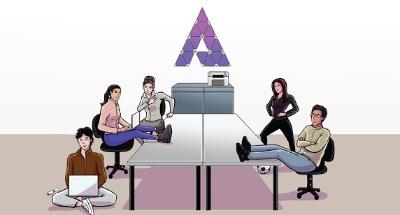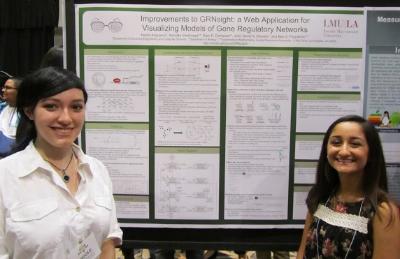Loyola Marymount University's Carnegie Classification is R2 Doctoral University: High Research Activity. LMU Computer Science offers a variety of research programs with student researchers from all years (from first-years to seniors as well as graduate students) actively participating in various research activities. Students from several majors work alongside computer science students in research teams housed within LMU computer science, and computer science students participate in research programs affiliated with other departments.
Many undergraduate students work side-by-side with faculty members on major research projects. Students have the opportunity to present the results of their research at regional, national and international conferences. A few of the department's research activities are outlined below.
-
- Faculty member
- Andrew Forney
Description
-
The Applied Cognitive Technologies Lab (ACT Lab) is a research group whose interests are found at the intersection of artificial intelligence, cognitive psychology, and experimental design. The bulk of the group's work focuses on formalizing the human analogs of causal and counterfactual reasoning and how those abilities shape our learning and decisions. Additionally, Dr. Forney sponsors a wide swath of student interests in undergraduate research projects, including: bias detection in online news articles, correcting for human biases in decision-making tasks, modeling learning from regret to make artificial agents more dynamic, and individualized difficulty adjustment in video games.
For more on the ACT Lab and a list of student research projects, see Prof. Forney's ACT Lab page.
 Drawing of students in ACT Lab, by Christian Santander, '20
Drawing of students in ACT Lab, by Christian Santander, '20
-
- Faculty member
- Lanyu Shang
Description
- This mixed-methods study explores how large language models can be tailored as assistive technology to support neurodivergent students in higher education settings, addressing a critical research gap by identifying their specific academic needs and developing AI-based solutions beyond the typical focus on social and workplace independence.
-
- Faculty member
- Lanyu Shang
Description
- This project is developing a generalizable deep learning system that exploits large language-vision models to identify and analyze misleading content across multiple social media platforms. It aims to reduce information disparity by providing comprehensive, multimodal detection capabilities and cross-platform content verification.
-
- Faculty member
- Jared Coleman
Description
- This research direction focuses on theoretical work in search and optimization strategies involving agents, particularly in adversarial or uncertain environments. Projects emphasize developing and analyzing algorithms for agent coordination.
-
-
- Faculty members
- Mandy Korpusik and Delaram Yazdansepas
Description
- In2Eat: An intuitive eating mobile application—This interdisciplinary grant project is investigating whether intuitive eating principles can improve diet quality, especially for LMU students experiencing food insecurity
-
Faculty member
- Mandy Korpusik
Description
- Coco Nutritionist: Diet tracking with natural language—Coco Nutritionist is an app that makes logging your meals easier through natural language, like you’re speaking to a nutritionist. Current work is adding computer vision and a food recommender system, as well as improving the backend Flask server code, deployment architecture, and front-end mobile application built with React Native.
-
-
- Faculty member
- Mandy Korpusik
Description
- This project investigates the use of eBERT embeddings to find the most similar eBay product title to items that are out of stock, as well as large language models to recommend related items. It is supported by a gift from eBay.
-
- Faculty member
- Jordan Freitas
Description
- This project explores the fundamental tension between data privacy and openness in research, and developing design principles for equitable, collaborative data management systems. Popular tools for data collection, cleaning, analysis, and sharing can benefit certain stakeholder groups over others depending on how they are designed and implemented. More accurate study of complex social issues depends on whether new tools enable differing perspectives to be reflected in the process and results of data analysis.
Projects revolve around case studies where collaborative data management and analysis are central requirements, as well as contributions to existing open source data management tools. Current projects include:
- Crowd-sourcing platform labels for EEG data
- Mobile data collection for clinical trials, in collaboration with the PECET at University of Antioquia, Colombia
- Extensions for adding new functionality to differential privacy libraries
-
- Faculty members
- John David N. Dionisio and Kam D. Dahlquist (biology)
Description
- Made up of many majors from computer science and related fields, one of the notable activities of this group is GRNsight, an open source tool suite for automatically visualizing models of gene regulatory networks and protein-protein physical interactions. GRNsight is a successor to GenMAPP (Gene Map Annotator and Pathway Profiler), software for viewing and analyzing DNA microarray and other genomic and proteomic data on biological pathways.

-
- Faculty member
- Jared Coleman
Description
- This research direction explores how AI and large language models (LLMs) can support the revitalization of endangered and low-resource languages.
-
- Faculty members
- John David N. Dionisio and Ray Toal
Description
- A fair amount of our in-house computing facilities, and much of our hands-on, practical, open-source-based curriculum, has roots in an NSF grant (Award 0511732, Cultivating an Open Source Software Culture Among Computer Science Undergraduate Students ) obtained by several members of the Computer Science faculty. Drs. Dionisio and Toal were the principal investigators.
The project was instrumental in creating a culture influenced by the values of the Open Source Initiative's Open Source Definition.
-
- Faculty member
- Mandy Korpusik
Description
- This project uses machine learning models, including logistic regression and random forest, to predict whether a new pregnant mother will have stress, anxiety, or depression after giving birth given her demographics, physical health, sleep, diet, and physical activity.
-
- Faculty member
- Ray Toal
Description
- This open-source GitHub repository serves as a useful portal for programming language information and sample code, especially comparisons between languages, for close to 100 different programming languages, including not only mainstream languages but experimental and lesser known languages too.
-
- Faculty member
- Jared Coleman
Description
- The scheduling research focuses on designing and evaluating algorithms to address real-world scheduling challenges, including dynamic workflows, stochastic processes, and task constraints.
-
- Faculty member
- Ray Toal
Description
- The Experimental Languages Group (xlg) is an informal working group doing research and development on programming language design. Rather than asking questions about design patterns for solving problems, the group is interested in patterns of language design and questions about languages themselves, such as:
- Is a language's syntax minimalistic (like Lisp) or sophisticated?
- How are control structures specified?
- Is the text word-oriented or does it make heavy use of symbols and punctuation?
- Is the language extensible? Does it employ macros? Does it allow embeddings of other languages?
- Are advanced control structures, such as concurrency, intrinsic to the language or does the language sport a small core with most functionality in (external) libraries?
- What kind of paradigms are naturally expressed?
- Does the language make it easy or hard to create immutable collections?
- Is typing static or dynamic? Strong or weak? Manifest or implicit?
- How are modules, with interfaces and information hiding, supported? Are there special structures to hold state? Does the language rely on closures?
- Does the language allow introspection? Dynamic compilation? Can pieces of programs be generated at run time?
In addition to studying, classifying, and suggesting improvements to existing languages, the group collaborates on the design and implementation of new research languages. The group is also looking into alternative methods for specifying syntax and semantics, novel approaches to compiler generation, machine-assisted program correctness proofs, and efficient implementations.